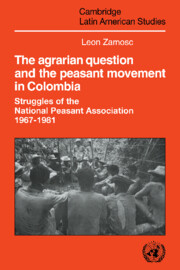 The Agrarian Question and the Peasant Movement in Colombia
The Agrarian Question and the Peasant Movement in Colombia Book contents
- Frontmatter
- Contents
- List of tables, figures, and maps
- Foreword by Tedor Shanin
- Foreword by UNRISD
- Acknowledgments
- List of abbreviations
- Map 1 Republic of Colombia
- Introduction
- 1 The agrarian question in Colombia
- 2 Reformism and the beginnings of the peasant movement
- 3 The radicalization of ANUC and the great waves of land invasions
- 4 Counterreform
- 5 The contradictory influences of peasant politicization
- 6 Concessions and repressive escalation
- 7 The new occupational alternatives and the issue of the rural proletariat
- 8 Partial repeasantization and the question of the new peasant settlements
- 9 Final crisis and clientelist regression of ANUC
- 10 Overview and final remarks
- Notes
- Bibliography
- Index
- Cambridge Latin American Studies
Foreword by UNRISD
Published online by Cambridge University Press: 10 October 2009
- Frontmatter
- Contents
- List of tables, figures, and maps
- Foreword by Tedor Shanin
- Foreword by UNRISD
- Acknowledgments
- List of abbreviations
- Map 1 Republic of Colombia
- Introduction
- 1 The agrarian question in Colombia
- 2 Reformism and the beginnings of the peasant movement
- 3 The radicalization of ANUC and the great waves of land invasions
- 4 Counterreform
- 5 The contradictory influences of peasant politicization
- 6 Concessions and repressive escalation
- 7 The new occupational alternatives and the issue of the rural proletariat
- 8 Partial repeasantization and the question of the new peasant settlements
- 9 Final crisis and clientelist regression of ANUC
- 10 Overview and final remarks
- Notes
- Bibliography
- Index
- Cambridge Latin American Studies
Summary
This volume presents the findings of one of the case studies carried out in Colombia under the Popular Participation Project of UNRISD, the United Nations Research Institute for Social Development. The Project focused on the organized activities of the “excluded” – peasants, workers, ethnic groups, poor urban dwellers – to increase their control over resources, decision-making processes, and regulative institutions of the larger society. It also analyzed in a historical perspective the encounter between such social movements and those social forces, structures, and ideologies that maintain an unequal distribution of power and wealth; and it looked more particularly at the role of the state in these encounter sequences. While the emphasis on the study of social movements reflected a rejection of a technocratic approach to the issues involved, the broader aim of the Project was to help clarify the idea of people's participation in order to make it operationally more useful. The Project included a number of research, action-research, and sub-debate activities that were complementary and linked together through a general debate carried out by the Institute on the theory and practice of participation.
In 1980 a series of studies were initiated in Colombia with the aim of exploring the characteristics and results of the major peasant struggles and movements that took place between 1950 and 1980.
- Type
- Chapter
- Information
- The Agrarian Question and the Peasant Movement in ColombiaStruggles of the National Peasant Association, 1967–1981, pp. xv - xviPublisher: Cambridge University PressPrint publication year: 1986


